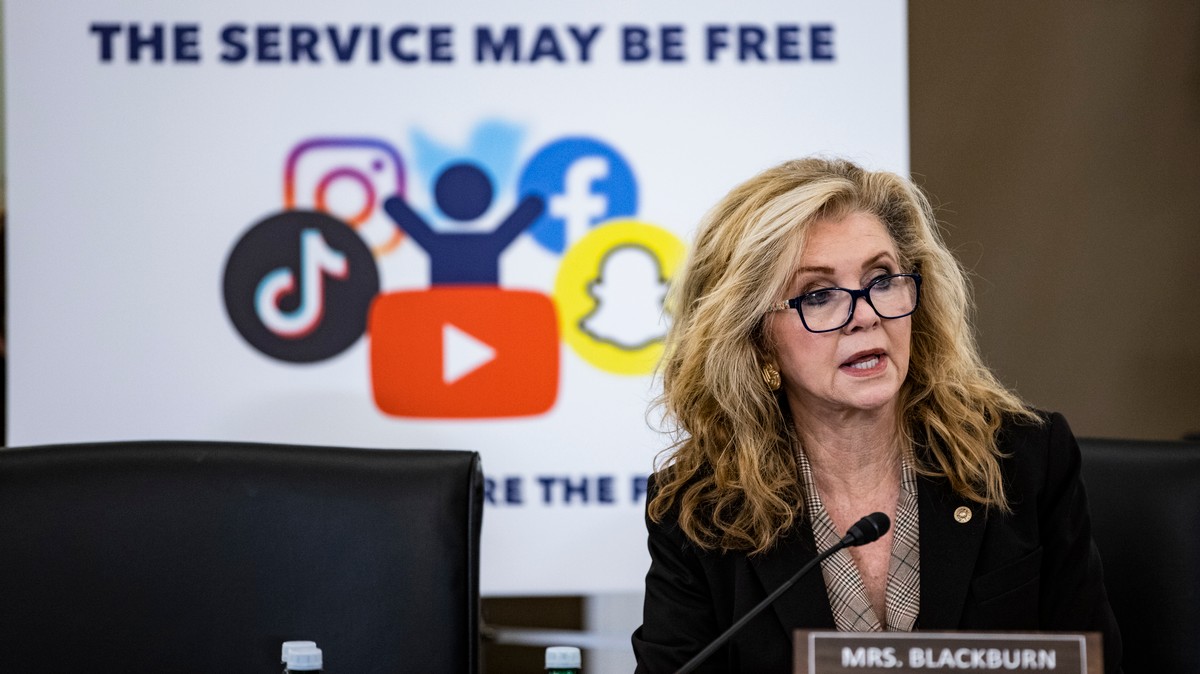Samuel Corum / Getty Images
Last week, the Senate Commerce Committee advanced the Kids Online Safety Act (KOSA), a bipartisan bill that lawmakers say is intended to stop online platforms from targeting and recommending harmful content to minors. On paper, the bill sounds like a necessary pushback against big tech platforms like Facebook and TikTok, which use algorithmic recommendation to show content users are most likely to engage with.
There’s just one problem: it’s supported by a slew of far-right, anti-LGBTQ organizations, and opponents are warning it will enable states to censor LGBTQ content by claiming it leads kids to depression, anxiety, and eating disorders.
Among the bill’s supporters is the National Center on Sexual Exploitation (NCOSE), a far-right “anti-trafficking” group previously known as Morality in Media that has lobbied against porn, sex workers, and LGBTQ rights since the 1960s. The group’s CEO, Patrick Trueman, has previously worked for the American Family Association and the Family Research Council—both far-right Christian organizations that have been designated as anti-LGBTQ hate groups by the Southern Poverty Law Center.
The bipartisan bill is also supported by the right-wing Heritage Foundation, which explicitly stated in a May 20 tweet that its goal with the bill is “keeping trans content away from children.”
While the group last year expressed that vague language in the bill could allow platforms to moderate with “woke” policies, it has continued to voice its support. “Many studies [have] shown the dangers that social media poses to children. Senator Blackburn’s Kids Online Safety Act is a common sense solution to address those concerns and start protecting our next generation,” the group wrote in a May endorsement on the website of the bill’s Republican sponsor, Marsha Blackburn.
The “dangers” the group is referring to can be easily found on the Heritage Foundation’s website, where it has repeatedly claimed without evidence that social media “turns kids trans.” Over the past year, right-wing groups and lawmakers have made similar false claims to justify punitive laws that ban books with LGBTQ themes from libraries, block transgender youth from receiving gender-affirming healthcare, and threaten parents who support trans children with criminal charges.
Other far-right groups that support the bill include the America First Policy Initiative and the American Principles Project, both of which oppose gay marriage and have recently campaigned against transgender rights. Blackburn herself has also taken vehemently anti-LGBTQ positions, and last year headlined at an anti-trans rally hosted by far-right podcaster Matt Walsh.
“KOSA will be weaponized against youth who are members of the LGBTQ community. That’s a statement of fact, confirmed by supporters of the bill who have repeatedly stated that they intend to use the bill against LGBTQ content,” states a letter written by the digital rights group Fight For The Future and addressed to the bill’s supporters. “Anti-trans bigots are telling us that they want KOSA passed to help them continue their campaign of hate, and we should believe them.”
The bill attempts to address a real problem: monopolistic tech companies using mass data collection and algorithms that drive people towards harmful content and misinformation. A recent report from Fairplay, one of the organizations pushing for KOSA, found that 73 percent of 200 apps surveyed are monetizing data collected from minors. Tech companies pad their bottom line by using this data to target ads, predict users’ behavior, and recommend content they’re most likely to engage with—a form of extraction and behavior modification that scholar Shoshana Zuboff calls “surveillance capitalism.”
Supporters say the goal of the bill is to reign in these tech platforms. The bill establishes a “duty of care” which forbids companies from recommending content that can lead kids to specific harmful outcomes, like anxiety or depression. The problem, of course, is that the definition of what “leads to harm” depends on who you ask.
The current bill is not the first version of KOSA to hit the Congressional floor. A previous iteration of the bill was dropped after being heavily criticized by digital rights and LGBTQ advocates. Lawmakers and groups that support the bill are now saying the new bill addresses these concerns, and some larger LGBTQ organizations such as the Human Rights Campaign GLAAD have since dropped their opposition.
Among the changes are an exception to the “duty of care” for news media websites, and modifying requirements on age verification for online platforms. The bill also bans targeted advertising for kids, requires that minors have the strongest privacy settings by default, and mandates that companies create parental controls for their platforms.
When contacted by Motherboard, Fairplay distanced itself from the anti-LGBTQ groups and claimed that the bill has been sufficiently amended to prevent abuse.
“Fairplay condemns homophobia and transphobia in any form. The fact that a tiny fraction of the hundreds of organizations that support KOSA have bigoted agendas is not evidence that KOSA is anti-LGBTQ nor does it mean that Fairplay endorses their views,” Josh Golin, the executive director of Fairplay, told Motherboard in a statement. “Guilt-by-association campaigns benefit no one in the long run, except the tech companies whose exploitation of children will continue unabated without new regulations.”
“I am grateful to the LBGTQ organizations who raised their concerns about the 2022 version of KOSA. In response to their concerns, the bill duty of care has been narrowed to make it much, much harder to weaponize and there is considerably less opposition to KOSA than there was in 2022,” Golin added. “It is disappointing that bad-faith actors are both misrepresenting the actual text of the bill and the depth of opposition which is considerably less as a result of these changes.”
Common Sense Media, another group driving support for KOSA, responded similarly.
“We are glad that advocates, including some LGBTQ+ groups, voiced their concerns about last year’s version of KOSA’s text,” the organization wrote in a statement emailed to Motherboard. “In response, the bill authors made many changes to the bill to narrow the duty of care and reduce the potential for unintended consequences. This has significantly boosted support for KOSA from LGBTQ+ groups and policymakers, including openly gay members of Congress.”
Some of the groups who signed letters of opposition last year have since dropped their opposition to the bill and taken a neutral stance. But a coalition of several dozen LGBTQ and digital rights organizations—including the ACLU, Fight For The Future, and the Electronic Frontier Foundation (EFF)—do still oppose the bill. Specifically, they say that the language has not changed substantively, citing open-ended definitions allowing state attorneys general to declare LGBTQ content as leading to harm, and force platforms to block minors from seeing it.
“KOSA is basically a blank check for extreme right wing attorneys general to bully platforms into suppressing content that they don’t like,” Evan Greer, the deputy director of Fight For The Future, told Motherboard. “They can claim that LGBTQ fan fiction makes kids depressed. They can claim content related to gender affirming care makes kids suicidal. They can even cherry pick medical studies as ‘evidence’ to support these claims.”
There is no scientific evidence that LGBTQ content makes kids depressed or anxious. But there are plenty of studies showing the reverse: that LGBTQ youth are significantly less likely to experience anxiety, depression, and suicidal ideation when they’re accepted by parents, peers, and society at large.
The battle over KOSA comes amidst a near-constant campaign of attacks on LGBTQ rights across the US. Politicians in over a dozen states have used dodgy and deceptively-cited evidence to pass laws banning transgender healthcare for minors, and in one case even extended the ban to adults. Far-right extremists have also repeatedly targeted libraries and other spaces hosting LGBTQ events, and far-right groups like Moms For Liberty have aggressively campaigned to remove LGBTQ-themed books from schools.
The bill’s supporters have described opponents as being supporters of Big Tech. The reality, Greer said, is that the goal of reigning in Big Tech is a noble one, but it can’t come at the cost of giving politicians another tool to erase LGBTQ people from public life.
“Big Tech companies’ surveillance capitalist business model is absolutely harming kids, and eroding human rights globally. But KOSA will make that situation worse, not better,” said Greer. “By refusing to listen to the concerns of the human rights community and taking energy and attention away from things like privacy and antitrust legislation where we have real consensus, KOSA supporters are helping Big Tech harm our kids.”
“There is incredible urgency around holding Big Tech companies accountable and abolishing their surveillance capitalist business model that is wreaking havoc on our kids and our democracy,” Greer added. “But we will never, ever, throw trans kids and human rights under the bus to accomplish that. And anyone who is willing to do that will have to come through us first. Good luck.”










